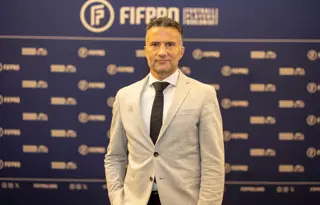News
Football and Ramadan: Three core considerations for players

- Many Muslim players across the world will be observing the religious month of Ramadan
- Some players will be fasting mid-season and have their usual rest and recovery clock altered
- FIFPRO Medical Director Prof Dr Vincent Gouttebarge takes us through the medical considerations around footballers observing Ramadan and highlights three core elements to boost the recovery of a player
Many Muslim players across the world are observing the religious month of Ramadan, with many doing so in the middle of the football season. For those who are fasting, daily routines around training, rest and recovery shift significantly – raising important questions about how the game can better support players during this period.
FIFPRO Medical Director Prof Dr Vincent Gouttebarge, a former professional footballer who played 14 seasons in France and the Netherlands, outlines the key medical considerations for footballers observing Ramadan and highlights three core elements to help optimise player recovery.

1. Nutrition
"Athletes typically require at least three proper meals a day to train and compete at a high level, and naturally there is a shift to two meals for players observing Ramadan, with the biggest meal being before sunrise so that they can keep going throughout the day. Ideally that meal should be high in glycaemic foods – such as potatoes and rice – that are rich in energy, while the meal after sunset should be low-glycaemic foods. Supplements might also be considered but the club physician should be consulted."
2. Hydration
"Hydration can be tricky, and we advise players to keep hydrated during the day and night as optimal as possible. It is not always possible to stay hydrated during the night of course, so it is about finding that balance between regular hydration and having a proper night of sleep. Cooling strategies can be employed to stop the loss of fluid through sweating, such as cold towels and mouth rinsing with water, while post-session cold showers can also help reduce fluid loss. Sodium supplementation should be considered, as well as avoiding coffee and tea."
3. Sleep
"During the month of Ramadan, a player’s body needs to adapt to an altered biological schedule. Therefore, sleep disturbance might have the biggest impact on a player. Your chronological clock is different than you are used to, and combined with the lack of nutrition and hydration during the day, it can be challenging to perform."

Other frequently asked questions on Ramadan
Are there any benefits or risks connected to fasting during the season?
"Fasting to perform at an elite level is not optimal, so from a physiological perspective there is no added value of fasting to perform better. However, there can be mental benefits for players fasting in the sense that because they know they are lacking energy, the spiritual element of Ramadan can mentally act as a source of additional motivation or inspiration to perform better.
"There have not been many medical studies that have analysed the effect of Ramadan on injury. There have been two conducted – one in Qatar, the other in Tunisia – but both followed different methodologies and found conflicting evidence on the frequency of injury sustained during Ramadan by comparison to a regular time period. So, as it stands, there are no clear, conclusive results that show that Ramadan leads to a higher risk of injury. Despite this lack of evidence, players and staff must remain cautious during this period of the year."

What medical, nutritional and psychological support can clubs give to help players observing Ramadan?
"While players need to understand the consequences of Ramadan for the three core aspects – nutrition, hydration and sleep – coaches also need to be informed and aware about how they can alter their training schedules for those players observing Ramadan. For instance, if a player is having a large meal before sunrise ahead of fasting throughout the day, then the coach can tailor that player’s training, ideally three hours after the meal to ensure they have had a proper digestion period.
"The other possibility is to have that player train in the evening. If a player was to train with high intensity in the afternoon, after a lengthy period without ingesting fluid or nutrition, then that cannot be beneficial for the performances and health of the player. Communication between the player and the coaching staff is therefore very important to ensure there is a joint strategy and optimal collaboration."
